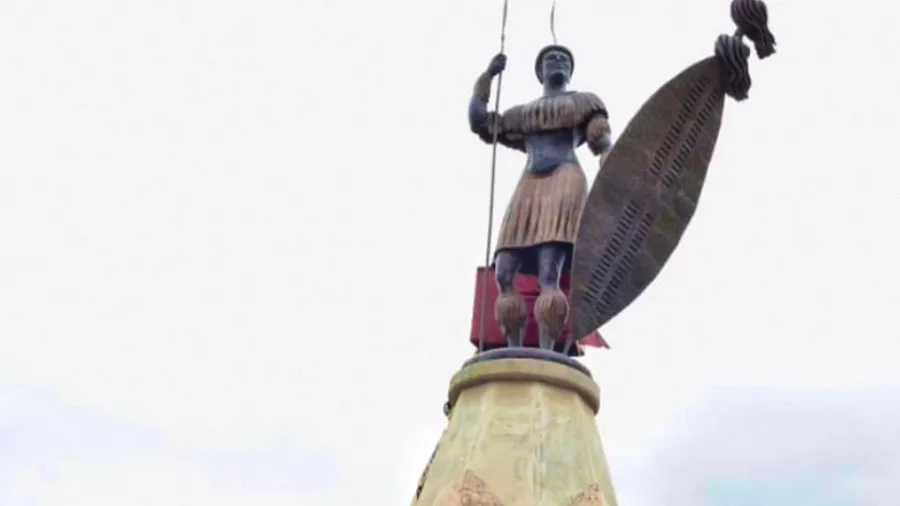South Africa unveils improved King Shaka statue at Durban airport
3 min read
A grand ceremony was hosted at the King Shaka International Airport on Thursday to officially unveil the King Shaka statue. Picture: Supplied

A grand ceremony was hosted at the King Shaka International Airport on Thursday to officially unveil the King Shaka statue. Picture: Supplied
South African President Cyril Ramaphosa and Zulu King Misuzulu kaZwelithini recently attended the unveiling of a new statue honoring the iconic Zulu leader, King Shaka. The much-anticipated ceremony, held on Thursday, featured the reveal of a 12-meter-tall statue at King Shaka International Airport in Durban, a figure that celebrates the legendary monarch who played a pivotal role in shaping the Zulu nation.
The statue depicts King Shaka as a warrior, holding a spear and shield, a fitting tribute to his military prowess and leadership. This new monument replaces a previous statue that had been widely criticized for its unflattering portrayal of the king. The earlier artwork was dubbed “the herd boy” due to its perceived lack of respect for Shaka’s stature as a powerful leader, which sparked public outcry.
King Shaka, who was assassinated in 1828, is remembered as one of Africa’s greatest military leaders. He is credited with uniting disparate clans into a single, formidable kingdom through his innovative tactics and reforms in warfare. His reign marked the beginning of the Zulu Empire, which dominated large parts of southern Africa. His legacy is deeply ingrained in Zulu culture, and his influence extends well beyond South Africa’s borders.
At the unveiling, President Ramaphosa emphasized that the statue stands as a symbol of unity, integrity, and leadership for all South Africans. He highlighted the importance of King Shaka’s legacy in not only Zulu history but also in shaping the broader national identity. “This statue is not just a tribute to King Shaka’s legacy, but also a symbol of the values we cherish in our country: unity, strength, and leadership,” said Ramaphosa.
The president also expressed hope that the statue would serve as an attraction for tourists, drawing attention to South Africa’s rich cultural heritage. “We hope that visitors to our country will take the time to learn more about our history and the figures who have shaped it, like King Shaka,” Ramaphosa added.
King Misuzulu kaZwelithini, who was also present at the ceremony, expressed pride in his ancestor’s enduring legacy. He praised the statue as an important representation of Zulu history and culture, reaffirming King Shaka’s role as the “father of the Zulu nation.” “This statue honors a great man who fought not just for the Zulu people, but for all of us,” said King Misuzulu.
The new statue is part of a broader initiative to honor South Africa’s heritage and to provide both locals and visitors with a tangible connection to the nation’s history. Shaka’s legacy continues to inspire many, not only within the Zulu community but across South Africa, where he is celebrated as a national hero.
The unveiling comes at a time when South Africa is increasingly focused on highlighting its cultural heritage and historical figures. In addition to King Shaka, other prominent leaders and historical events are being commemorated through public monuments and educational initiatives. The country’s efforts to preserve its rich cultural identity are seen as a vital part of the post-apartheid narrative, where reconciliation and pride in shared history are key themes.
For many, the new King Shaka statue represents a long-overdue recognition of the Zulu king’s importance in both South African and African history. While the previous statue failed to do justice to Shaka’s legacy, this new monument is a powerful visual representation of his impact and the respect he commands.
As South Africa continues to grapple with its complex history, the unveiling of the King Shaka statue serves as a reminder of the importance of leadership, unity, and cultural pride. With its towering figure, the statue not only honors the past but also offers a vision for a future that embraces South Africa’s diverse and rich heritage.
In addition to its cultural significance, the King Shaka statue is also a part of South Africa’s broader efforts to boost tourism and promote the country’s history to the world. By celebrating figures like King Shaka, the country hopes to encourage deeper understanding and appreciation of its past, while also drawing attention to the vibrant cultures that continue to shape its present and future.
As tourists and locals alike visit the statue, they are reminded not only of the strength and resilience of the Zulu people but also of South Africa’s ongoing journey toward unity and national pride.